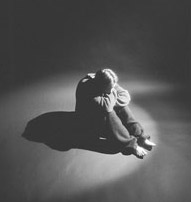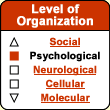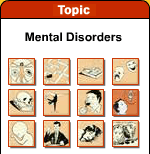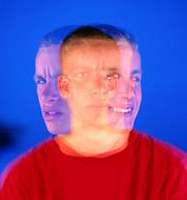|
|

 |
 |
 |
 |

 |
 |
In some cases of depression,
it is hard to discern any particular triggering event. Such
depressions are described as endogenous (or,
to use an older term, melancholic). Individuals
with endogenous depression see themselves as the only possible
source of their suffering and think that everything is their
own fault. Their emotional pain is absolutely unaffected
by the attitudes of the people around them. For such patients,
treatment with antidepressants is often spectacularly successful.
In contrast, cases of reactive depression are
associated with recent events or conflictual psychological
situations. Individuals with reactive depression feel isolated
and abandoned. Very often, they see what is happening to them
as someone else's fault. They therefore tend to see themselves
much more as victims than as guilty parties (the opposite of
how people with endogenous depression see themselves). People
with reactive depression often develop somatic symptoms and
make suicide attempts, but these often represent a cry for
help, a way of mobilizing support from the people around them.
The kinds of events that are often the cause of reactive depression
include a death in the family, a relationship breakdown, or
a business failure. But sometimes even problems that might
seem trivial to an outside observer undermine an individual's
self-esteem so seriously that they can lead to reactive depression.
In such cases, the slightest experience that bolsters self-esteem
can lead to dramatic improvements. |
|
|
| SYMPTOMS, TREATMENTS,
AND CAUSES OF DEPRESSION |
|

Source:
Debbie Aldridge/Illustration Services photo
|
|
Psychiatrists
generally consider an individual to be suffering from depression
when he or she presents a set
of symptoms that include a morbid state of mind, a generalized
sadness that pervades all areas of life, a loss of interest
and pleasure in most activities, and a slowing of mental
and motor activity, and when these symptoms persist every
day for at least two weeks.
Most likely, the symptoms of depression actually reflect
several distinct psychological mechanisms. These differences
might explain why certain treatments with
antidepressants have a beneficial effect on some patients
but none at all on others. |
Though we do not know the exact causes of
depression, we do know that a number of factors contribute to its
development. These factors interact, so that depression, rather
than having a single cause, usually occurs when a number
of unfavourable circumstances coincide in a person's life. These
contributing factors can be classified into the following three
categories.
Environmental factors
Environmental factors are events external to the individual
that can contribute to the development of depression. Examples
include the death of a loved one, divorce, job loss, financial
problems, and a disabling illness or injury.
It is estimated that nearly half of all cases of depression
are related to stressful situations. Also, several studies
have shown that stress at an early age can predispose an individual
to develop depression in adult life. In light of the harmful
effects that chronic
activation of the stress axis is known to have on neurogenesis,
it is not surprising that inhibition
of action can seriously predispose someone to depression. |
|
Psychological factors
A person's history—whether they had a hard childhood
or, on the contrary, were given lots of encouragement and opportunities
to grow and flourish—shapes their personality and makes
them more or less susceptible to depression.
People who are constantly having problems in their relationships,
or trouble in communicating, or feelings of loneliness are
at a greater risk of experiencing depressive episodes. The
lack of a close, trusting relationship, whether with a friend
or with a lover, can also increase the risk of depression.
The quality of the support that we receive from our interpersonal
relationships thus helps to reduce our physical and emotional
reactions to stress and thereby protect us from depression. |
|
Genetic
(hereditary) factors
We now know that some genetic factors that affect the functioning
of the brain may make people more vulnerable to depression.
For example, people with close relatives who have suffered
from depression have a 15% risk of developing it themselves,
while people with no such relatives have only a 2 to 3% chance.
Interestingly, children who are born to parents with histories
of depression but adopted by parents with no such histories
still have a 15% risk of developing this condition. In identical
twins (who have exactly the same genes), the probability that
one twin will experience depression if the other has done so
jumps to 70%. |
Even though certain genes are implicated
in depression, they do not seem to trigger this illness inevitably.
Instead, they simply transmit a susceptibility to falling into
depressive states more readily—a greater likelihood that
given the individual's particular personality traits, or a particular
external event, he or she might develop clinical depression.
It is also important to realize that regardless of whether the
factor or factors that trigger a depressive episode are environmental,
psychological, or genetic, they will inevitably affect the activity
of certain areas and certain
neurotransmitters in the brain. In the final analysis, it is
these physiological disturbances that are the proximal cause of
the symptoms of depression. In contrast, the environmental, psychological,
and genetic factors may be regarded as distal or ultimate causes.
That is why it can be so important to try to trace these symptoms
back to their ultimate causes through psychotherapy.
For psychotherapy to succeed, however, the patient may sometimes
have to be treated with medication first.
Depression can be regarded
as an emotional disorder in which certain emotions are experienced
very intensely. It is thus distinguished from psychotic
disorders, which are related more to disordered
thoughts. Sometimes, however, a depression can be so emotionally
intense that it results in cognitive problems as well. |
|
|






 Bipolar disorder involves mood disturbances
that are manifested in phases of depression followed by phases
of excitation (mania), which is why this disorder was long known
as manic depression. These phases can vary in intensity and are
sometimes interspersed with normal periods where the individual
functions relatively well.
Bipolar disorder involves mood disturbances
that are manifested in phases of depression followed by phases
of excitation (mania), which is why this disorder was long known
as manic depression. These phases can vary in intensity and are
sometimes interspersed with normal periods where the individual
functions relatively well.